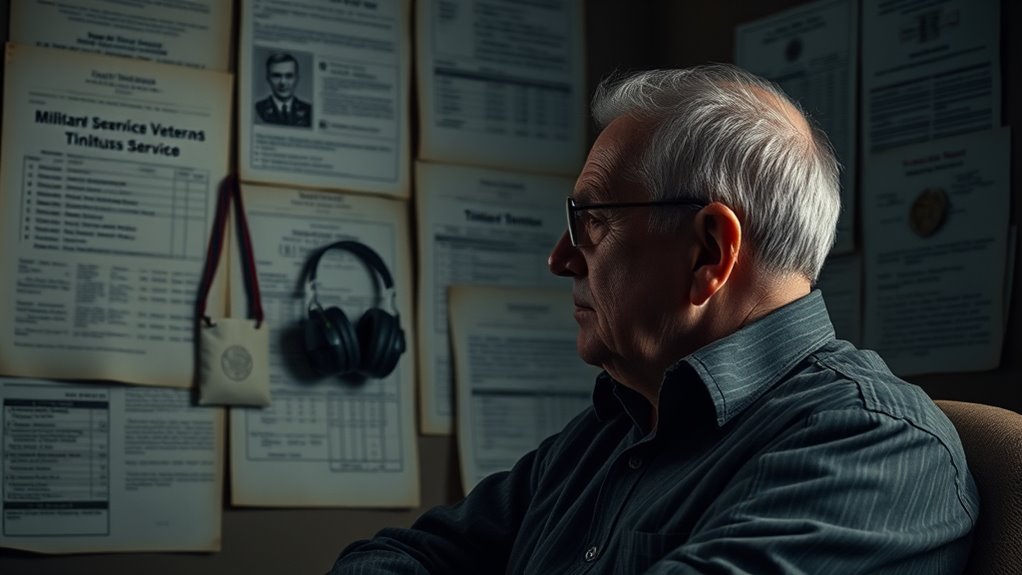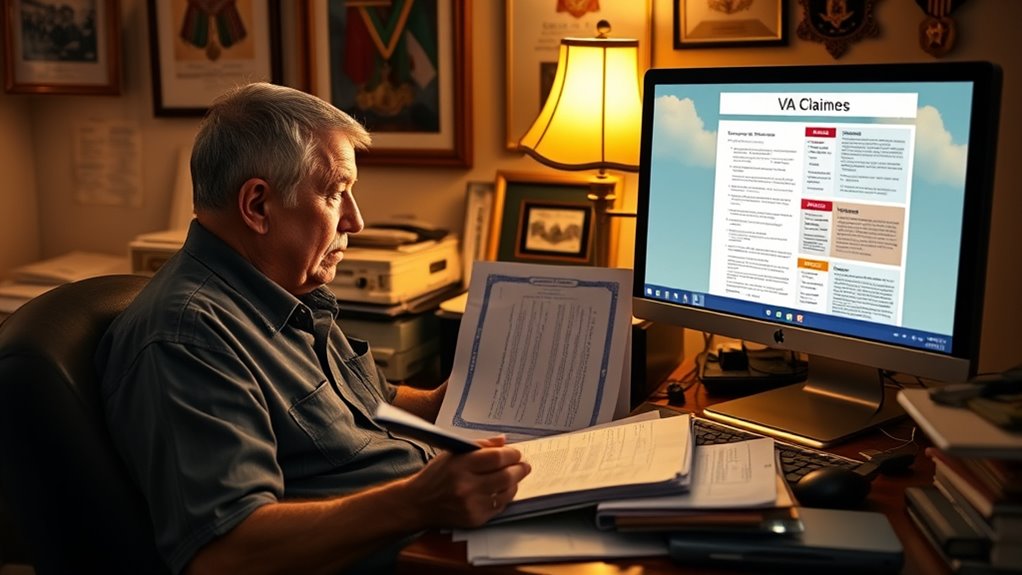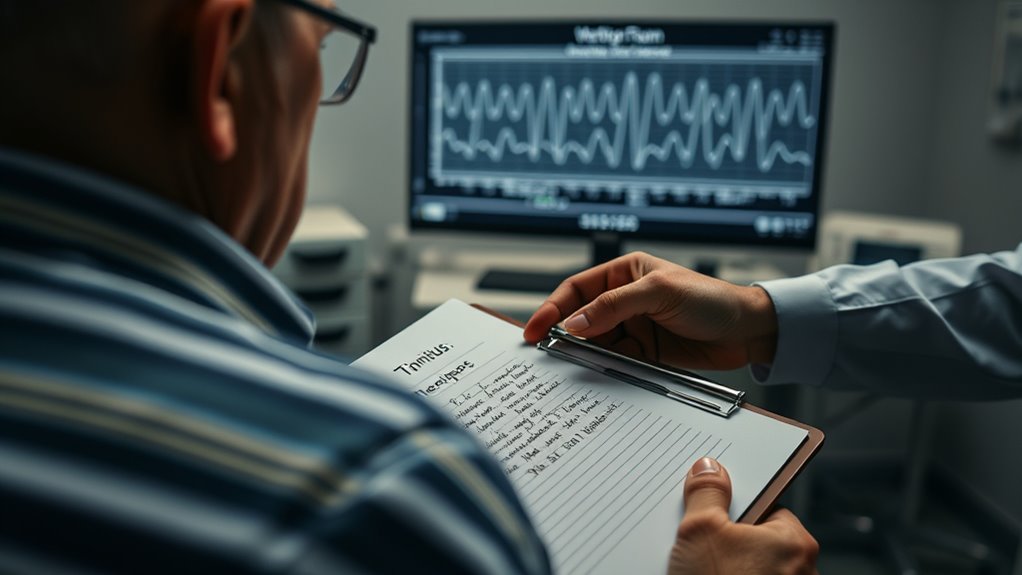To prove your tinnitus is service-connected, document your military noise exposures, like explosions or firearm use, and link these to your symptoms. Gather medical records, audiology tests, and expert opinions showing your tinnitus began during service or worsened due to military activities. Keep a detailed record of symptoms to support your claim. If you keep exploring, you’ll discover how to build a stronger case and navigate the VA process effectively.
Key Takeaways
- Document veteran’s exposure to loud noises in service, such as gunfire or explosions, to establish the onset of tinnitus.
- Obtain thorough medical evaluations, including audiology tests and tinnitus questionnaires, to support symptom severity and duration.
- Secure medical nexus statements from healthcare professionals linking tinnitus directly to military noise exposure.
- Gather detailed service records and incident logs that confirm exposure to loud environments during active duty.
- Use professional opinions and comprehensive documentation to strengthen the claim and demonstrate a clear service connection.
Understanding Service-Connected Tinnitus

Understanding service-connected tinnitus is essential if you’re seeking VA disability benefits or trying to grasp how your condition relates to your military service. During military training, you’re often exposed to loud noises from firearms, aircraft, and heavy equipment, which can damage your hearing over time. This noise exposure is a common cause of tinnitus, a ringing or buzzing that persists even after the noise stops. Recognizing that your tinnitus may be linked to these training exercises helps establish a connection to your service. It’s important to understand that such noise exposure during active duty can lead to long-term hearing issues, making your tinnitus a valid service-connected condition. Knowing this link is the first step in pursuing your VA disability claim. Additionally, understanding how self-watering plant pots work can be useful for maintaining healthy indoor plants, which can improve your living environment and reduce stress.
Gathering Medical Evidence of Tinnitus

To successfully establish your service-connected tinnitus claim, gathering thorough medical evidence is essential. You’ll need to undergo auditory assessments conducted by a qualified healthcare professional to evaluate your hearing health and document tinnitus symptoms. These assessments often include hearing tests and evaluations of auditory function. Additionally, tinnitus questionnaires can help quantify the severity and impact of your condition, providing valuable detail for your claim. Make sure your healthcare provider thoroughly documents your symptoms, their duration, and how they affect your daily life. Accurate, detailed medical records establish a clear record of your tinnitus, making it easier to link it to your military service. Collecting this evidence early ensures your claim has the strongest possible foundation. Incorporating sound design techniques and understanding how auditory environments influence tinnitus can also support your case.
Linking Tinnitus to Military Service

Establishing a connection between your tinnitus and military service requires clear evidence that your symptoms began during or were caused by your time in the military. Veteran testimonies can be powerful proof, especially if you experienced loud noises from combat, explosions, or machinery. Your personal account helps demonstrate how your tinnitus started or worsened during service. To strengthen your claim, consider how your symptoms align with known military exposures. Once the link is established, understanding treatment options becomes essential. These may include sound therapy, medications, or counseling, which can help manage your condition. Providing detailed descriptions of your experiences and symptoms, along with supporting evidence, increases your chances of securing service connection for your tinnitus. Additionally, understanding the role of projector technology can help in creating a comfortable environment for therapy sessions or relaxation at home.
Documenting Your Military Service and Exposures

Accurately documenting your military service and exposures is essential for supporting your tinnitus claim. Your service records provide a detailed history of your active duty, including dates, units, and locations. These records help establish a timeline and verify your service details. Additionally, keeping exposure logs can be invaluable; note specific noisy environments or incidents, such as gunfire or explosions, and any protective measures you used. Collect any related documentation, like accident reports or medical evaluations from service. These records and logs create a solid foundation, demonstrating your exposure to noise hazards during service. Understanding noise exposure risks can help you better identify potential sources of your tinnitus. Clear, detailed documentation makes it easier to connect your tinnitus to your military experiences and strengthens your claim. Always keep copies of these records for future reference.
Navigating the VA Claims Process

When maneuvering the VA claims process, gathering solid medical evidence is vital to support your tinnitus claim. You should also understand how the appeals process works in case your initial claim is denied. Being prepared with documentation and knowledge will help you move through each step more confidently. Additionally, understanding the importance of establishing a clear service connection can significantly strengthen your case.
Gathering Medical Evidence
Gathering strong medical evidence is essential to successfully steering the VA claims process for service-connected tinnitus. Your primary goal is to obtain thorough hearing tests that document your condition. These tests, conducted by an audiologist, measure your hearing thresholds and identify any deficits linked to tinnitus. Confirm that audiology reports clearly detail your hearing loss and how it correlates with your tinnitus symptoms. Collect all relevant medical records, including prior diagnoses and treatment notes, to support your claim. Well-documented hearing tests and detailed audiology reports serve as critical evidence to establish the link between your service and tinnitus. The stronger your medical documentation, the better your chances of securing the benefits you deserve. Additionally, understanding the evaluation process used by VA examiners can help ensure your evidence aligns with their assessment criteria.
Understanding the Appeals Process
Understanding the appeals process is essential if your initial VA claim for service-connected tinnitus is denied. Knowing how to navigate appeals procedures can help you secure the benefits eligibility you deserve. First, review the decision letter carefully, noting the reasons for denial. Then, file a Notice of Disagreement (NOD) within the required timeframe. Afterward, you can request a hearing or submit additional evidence to strengthen your case. To illustrate, consider this overview:
| Step | Key Action | Timeline |
|---|---|---|
| Receive denial letter | Review reasons for denial | 60 days |
| File NOD | Initiate appeal | 1 year from decision |
| Gather new evidence | Support your claim | As needed |
| Attend hearing | Present your case | Scheduled date |
| Receive decision | Await final VA ruling | Varies |
Expert Opinions and Medical Nexus Statements

Expert opinions and medical nexus statements are essential in establishing your tinnitus as service-connected. Your doctor’s documentation and testimony can strengthen your claim by clearly linking your condition to your military service. Ensuring these are thorough and well-supported can make a significant difference in the VA’s decision. Incorporating detailed information about your best anime movies or other relevant evidence can further support your case.
Medical Nexus Documentation
Medical nexus documentation is essential in establishing a connection between your service and your tinnitus condition. It provides the necessary proof that your auditory health issues, like military tinnitus, are linked to your time in service. A strong nexus can make or break your claim. Medical opinions from qualified professionals detail how your tinnitus relates to your military duties. These statements should clearly explain the connection and support your case. To understand the importance, consider this table:
| Aspect | Explanation |
|---|---|
| Expert opinion | Validates the service connection |
| Medical report | Details your tinnitus history |
| Supporting evidence | Reinforces the nexus |
| Clear causation | Links military noise exposure to tinnitus |
| Credibility | Enhances your claim’s strength |
Proper documentation is your key to a successful disability claim. Additionally, including detailed medical nexus statements from audiologists or physicians can significantly strengthen your case by providing expert validation of the link between your military service and tinnitus.
Expert Witness Testimony
When establishing a service connection for tinnitus, expert witness testimony plays a crucial role in strengthening your claim. An experienced medical professional can provide a clear opinion linking your tinnitus to your military service, especially if you’ve received hearing aids or undergone tinnitus therapy. Their detailed statements can clarify how your condition developed or worsened during service, supporting your case for service connection. An expert can also address how ongoing treatments, like hearing aids, improve your quality of life and demonstrate the severity of your tinnitus. Including a well-prepared medical nexus statement from an expert adds credibility and can help overcome any doubt about your claim’s validity. Their testimony is often a decisive factor in securing service-connected status for tinnitus. Additionally, demonstrating the effectiveness of treatments such as hydrocolloid patches can highlight the importance of proper diagnosis and management strategies in related conditions.
Common Challenges and How to Overcome Them

Dealing with service-connected tinnitus can be challenging because the constant ringing or buzzing often disrupts daily life and concentration. To overcome these hurdles, focus on effective tinnitus coping strategies.
Managing service-connected tinnitus involves stress reduction, routine breaks, and seeking support to improve daily life.
- Practice stress management techniques like deep breathing or meditation, which reduce the intensity of tinnitus symptoms.
- Establish a routine that includes regular breaks and quiet moments to help your mind relax.
- Seek support from professionals or support groups to learn new coping methods and share experiences.
- Understanding your sexual health risks and managing related concerns can also contribute to overall well-being and reduce stress.
Frequently Asked Questions
How Long Does the VA Process Typically Take for Tinnitus Claims?
The VA process for tinnitus claims usually takes between 3 to 8 months, depending on your case. After your tinnitus diagnosis and VA documentation submission, the VA reviews your medical records and evidence. Sometimes, additional exams or evidence requests can delay the process. Staying patient and ensuring all your documentation is complete helps speed things up. Keep track of your claim status online for updates throughout the process.
Can Civilian Noise Exposure Impact Service-Connected Tinnitus Claims?
Civilian noise exposure can impact your service-connected tinnitus claim if you can link it to your current condition. While service-related tinnitus is primary, evidence of civilian noise-induced tinnitus may support your case. You’ll need to show that your tinnitus worsened or originated from civilian noise exposure after service, and that it’s connected to your military experience. Providing detailed records and expert opinions strengthens your claim.
Are There Specific Military Jobs More Likely to Cause Tinnitus?
While some military jobs are more likely to cause tinnitus, like noise-sensitive roles such as infantry or aviation, others seem less risky. Military occupational hazards vary, but those exposed to constant loud noise face a higher chance of developing tinnitus. You should consider these roles when evaluating your risk. If your job involved prolonged exposure to loud sounds, it could strengthen your claim for service-connected tinnitus.
What if My Tinnitus Symptoms Started After Discharge?
If your tinnitus symptoms started after discharge, you should still document the timing of symptom onset clearly. It’s important to show when your symptoms began relative to your discharge date. This helps establish a potential connection to your military service. Keep detailed records of your symptoms and any related incidents during service, as this information can support your claim for service connection, even if symptoms appeared after leaving active duty.
Can Secondary Conditions Affect My Tinnitus Claim Approval?
Secondary conditions can definitely affect your tinnitus claim approval, as they may complicate your case. If you have conditions caused or worsened by your tinnitus, the VA might see your claim as more complex, potentially leading to claim complications. It’s important to provide thorough medical evidence linking these secondary conditions to your tinnitus. This way, you improve your chances of a successful claim by showing how your conditions are interconnected.
Conclusion
By building a strong bond between your military memories and medical evidence, you’ll better battle the barriers of proving your tinnitus is service-connected. Document your duties, detail your exposures, and diligently gather medical opinions to demonstrate the direct link. With determination, detailed documentation, and expert support, you’ll diminish doubts and drive your claim forward. Don’t delay—diligently detail, defend, and deliver your case to secure the service-connected support you deserve.










